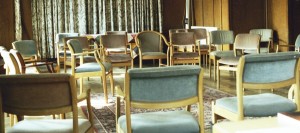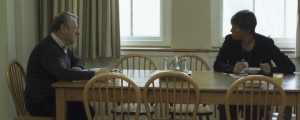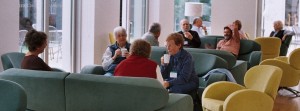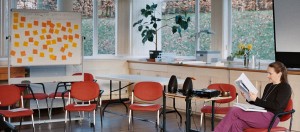In 1981 I went to Woodbrooke for the first time. A friend had said ‘if you ever get the chance to go to Woodbrooke, take it’ so when I saw an advertisement for an assistant cook (and I was looking for work) I applied. Woodbrooke offered me an expenses paid interview including an overnight stay (I was living in Edinburgh at the time). When I arrived I was invited to join in with the activities that were going on, in the time when I wasn’t being interviewed. One of these was a term-time course group who were considering, that morning, something about staff-management relationships in business and the role of trade unions. This was material I was familiar with from my recently completed management degree.
The ‘tutorial’ was a revelation to me. We sat in a circle in the quiet room, the tutor on a totally equal footing with the students and myself. Everyone’s views were listened to and valued. Everyone had the chance to contribute. It was so different to university classes where the tutor (especially in this subject area) told us what to think, what to read, virtually what to write in our essays. He had not expected us to have views, let alone valued them.
This was a totally different approach to learning, and it really put into practice Quaker ideas about equality. I have never forgotten it.
Another very significant learning experience for me was a course at Charney Manor early in 2006. One of the tutors introducing the course remarked that there would be things offered to us during the weekend that we might not like. He did not ask us to like them, but did request that we try them, because we might come to like them, or to learn something from them. At a later session we came in to some chanting being played on a CD. I took an immediate dislike to this noise and nearly walked straight out. Fortunately I remembered the tutor’s request and stayed. The music stayed in my head all day and overnight (an earworm). It could have been really irritating, but waking in the night I found it helped me to cope with the symptoms that had woken me, calmed me down and got me back to sleep. I was hooked and next morning was asking the tutor for details of the CD. I have played it many times since.
I have since become particularly interested in how we learn, how we unlearn, and how people can be helped to understand the Quaker way by different ways of learning about it. There is a place for factual, information-rich head learning, but the experiential heart learning is also vital. Even more important is enabling people to access what they already know but may be unaware that they know. The role of tutor, or facilitator, is often far more one of modelling ways of behaving and of learning, than one of teaching and imparting information. It involves creating a supportive space and enabling people to access deeper levels of understanding, which are often beyond words. It involves recognising that my role is to let ‘God’ act through me, so I must set aside my personal aims and agendas. Ultimately, learning about things of the Spirit, the things which are eternal, is the work of the Spirit, of the Light of Christ (whatever we call it) working in each individual, the role of a facilitator can only be to help enable that. As George Fox said ‘There is one, even Christ Jesus, that can speak to thy condition‘ QF&P 19.02
I am grateful to my meeting, to Woodbrooke and to my co-facilitators for the opportunities I’ve been given to facilitate a range of learning groups at Woodbrooke, online, in my meeting, at Swarthmoor Hall and elsewhere.





Pingback: L is for… Learning | Brigid, Fox, and Buddha